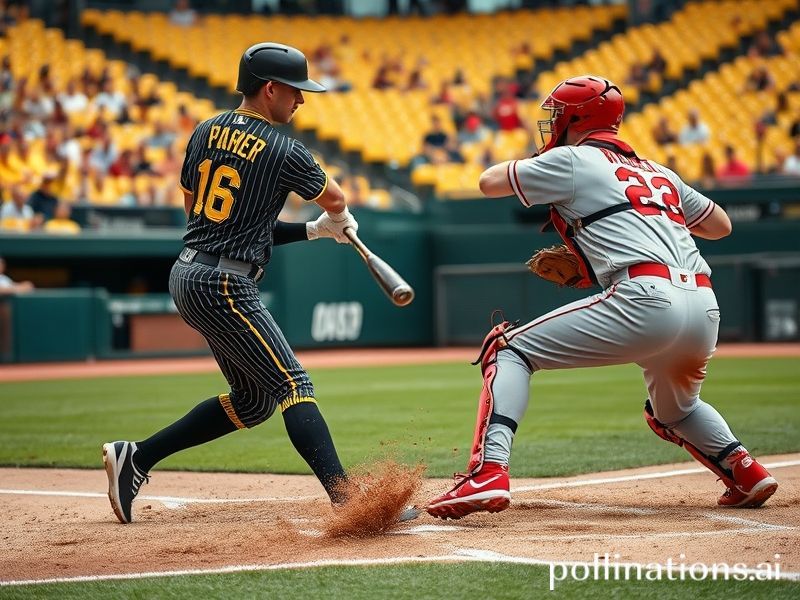Pirates vs Reds: A Global Farce Played Out Between Two Rust-Belt Relics
Pirates vs Reds: A Global Bloodletting in Technicolor
From the vantage point of a hotel bar in Singapore—where the air-conditioning hums like a guilty conscience and the barman pours watered-down Manhattans with the solemnity of a UN peacekeeper—it becomes clear that the eternal struggle between Pirates and Reds is less a baseball rivalry and more a tidy allegory for humanity’s broader talent for self-inflicted wounds. The Pittsburgh Pirates and Cincinnati Reds, two rust-belt franchises whose combined payroll would barely cover a mid-tier oligarch’s yacht maintenance, are currently locked in a series so devoid of consequence that UNESCO briefly considered listing it as Intangible Cultural Apathy. Yet the world watches, because the world, bless its easily distracted heart, will watch anything that distracts from the larger, more expensive fiascos unfolding on the geopolitical stage.
Consider the international stakes. In Kyiv, a Ukrainian drone operator streams the game between sorties, comforted by the knowledge that somewhere, two American cities are also lobbing projectiles at one another, albeit under the civilizing influence of instant replay. In Lagos, a crypto-currency day-trader toggles between the live box score and a collapsing stable-coin chart, comforted by the symmetry: both lines trend downward with the inevitability of a Greek tragedy performed by mascots. Meanwhile, in Shanghai, an AI language model—tasked with summarizing Western pop culture for Party cadres—flags the phrase “bullpen meltdown” as potential anti-socialist propaganda. One can almost hear the algorithm sigh.
The Pirates, whose payroll is roughly the annual defense budget of the Maldives, have become the poster children for austerity chic. Their fans, clad in throwback jerseys manufactured in the same Bangladeshi sweatshops that clothe European fast-fashion victims, wave Jolly Rogers ironically—because nothing says rebellion like officially licensed merchandise. The Reds, meanwhile, answer to a color historically associated with revolution, workers’ uprisings, and 70 percent of the world’s remaining Coca-Cola logos. Somewhere, an elderly Marxist in Havana spits out his rum, wondering why the dictatorship of the proletariat never managed a decent bullpen.
And then there is the matter of legacy. The Reds once fielded the Big Red Machine, a juggernaut so ruthlessly efficient it could have been designed by the same Germans who engineer Bundesliga trophies. The Pirates countered with the Lumber Company, a nickname that now reads like a hedge fund specializing in teak futures. Today, both rosters are stocked with players whose names sound like password generators—Ke’Bryan, Oneil, Tejay—monikers that scan equally well on a Dominican birth certificate or a Maltese shell corporation. If baseball is America’s pastime, then roster construction is its offshore banking.
But let us not overlook the soft-power implications. Each strikeout, each anemic batting average, is beamed via satellite to military bases in Djibouti, where Marines place prop bets in stable currencies. Each ceremonial first pitch—often hurled by a local congressman who couldn’t locate the strike zone with a GPS and a blood oath—echoes through the algorithms that decide what gets recommended to insomniacs in Jakarta. The world shrinks, the broadcast rights swell, and suddenly a Tuesday night snoozer in the NL Central becomes a trans-Pacific exercise in mutually assured boredom.
And still, we watch. Not because we care who claims the Ohio River Valley bragging rights—spoiler: neither side will—but because the alternative is to stare directly at the flaming headlines: melting ice caps, resurgent autocrats, airline passengers brawling over reclining etiquette. Compared with such enormities, a 5-2 loss feels almost quaint, like choosing the guillotine over the firing squad because the blade comes with artisanal craftsmanship.
As the final out is recorded somewhere around the international dateline, the planet rotates indifferently on its axis. The Pirates fly home to ponder another rebuild; the Reds to another wildcard mirage. And in the global ledger of human folly, the game earns a footnote no longer than a haiku: two cities, nine innings, zero lessons learned. The barman in Singapore wipes down the counter, already preparing tomorrow’s watered-down optimism. Somewhere, the next conflict begins, and the world keeps score in a language no one bothered to translate.







